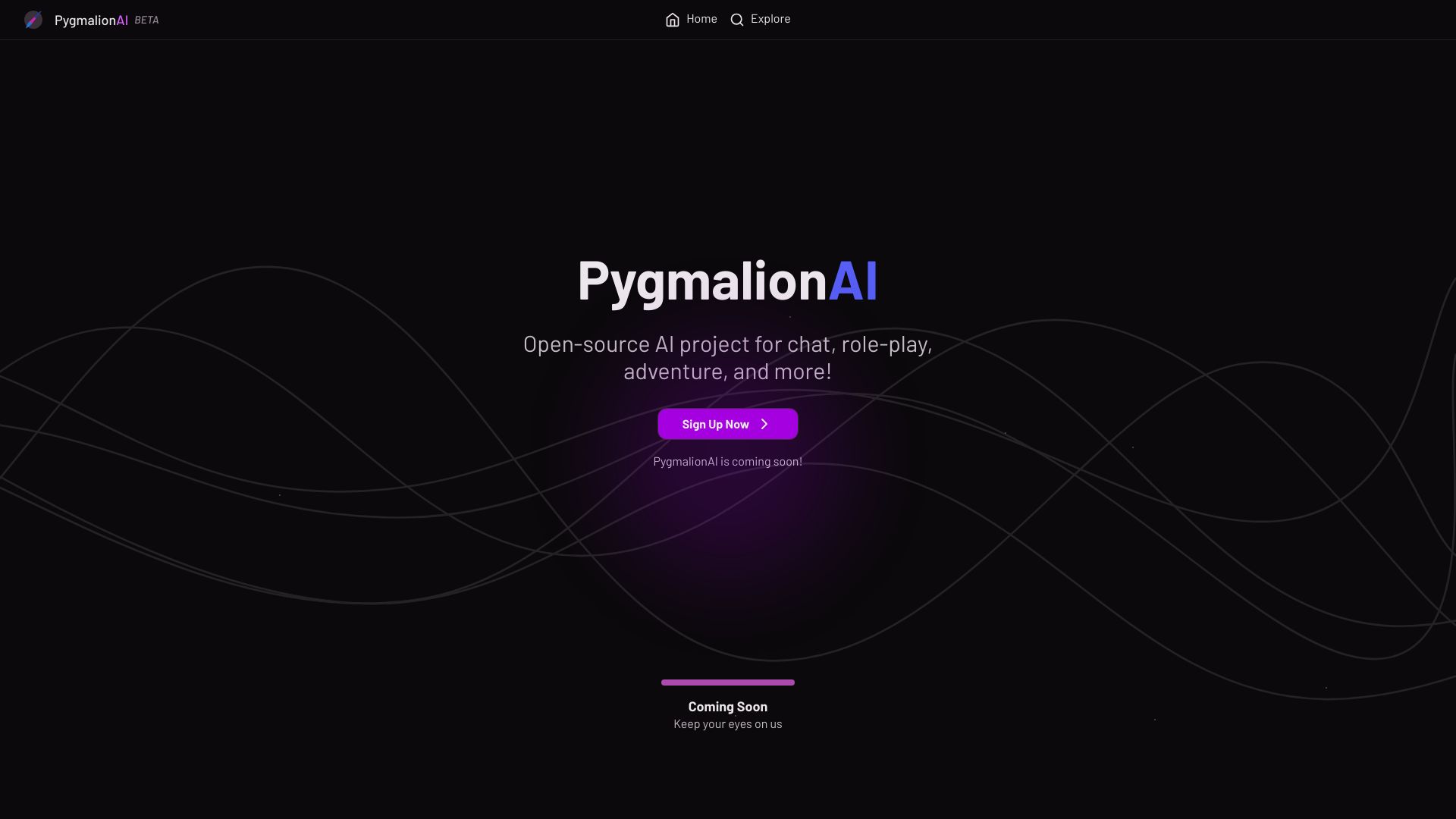- Home
- AI Text Generator
- PygmalionAI

PygmalionAI
Open Website-
Tool Introduction:A universal AI that turns ideas into action across work and life.
-
Inclusion Date:Oct 21, 2025
-
Social Media & Email:
Tool Information
What is PygmalionAI
PygmalionAI is an open-source project focused on conversational large language models tailored for chat, role-play, and adventure scenarios. It offers a character-centric chat platform where users can interact with AI personas, create and share character cards, and join open chats for collaborative storytelling. With access to in-house and curated models, users can fine-tune tone, style, and behavior for tailored conversations. The core value lies in flexible, minimally gated dialogue experiences and a community-driven approach to improving models, prompts, and character design.
PygmalionAI Main Features
- Character-driven chat: Engage with AI characters designed with distinct personalities, goals, and speaking styles.
- Character card creation: Build and share character cards with traits, lore, example dialogues, and behavior guidelines.
- Curated and in-house models: Choose from multiple role-play optimized LLMs to match latency, quality, and context needs.
- Open chats: Join collaborative rooms for group role-play, adventures, or community storytelling.
- Customizable prompts: Adjust system and character prompts to shape tone, boundaries, and narrative flow.
- Session memory controls: Manage context, message retention, and summaries to keep long-running chats coherent.
- Self-hosting flexibility: Run models locally or via third-party UIs for privacy and full control over settings.
- Import/export: Move character cards and conversations between clients or devices for consistent experiences.
PygmalionAI Suitable Users
PygmalionAI suits role-play enthusiasts, fiction writers, and world-builders who want flexible character chat. It also helps indie game developers prototype NPC dialogue, educators create safe practice dialogues, researchers explore conversational agents, and community moderators run themed group chats. Users who value open-source models and the option to self-host for privacy will find it especially useful.
PygmalionAI Usage Steps
- Sign in to the platform or set up a compatible local/client interface.
- Browse the character library or create a new character card with traits, lore, and sample dialogues.
- Select an in-house or curated model based on desired quality, speed, and context length.
- Configure prompts and session settings (persona depth, safety boundaries, memory length).
- Start chatting, refine the character card, and adjust prompts to steer tone and behavior.
- Join or create open chats for collaborative role-play or group storytelling.
- Export character cards or conversation logs for reuse, backup, or sharing.
PygmalionAI Industry Use Cases
Studios and indie devs prototype NPC dialogue and branching narratives before integrating into games. Creative teams use character cards to brainstorm plots, build lore, and test voice consistency. Training teams simulate customer profiles for soft-skill practice. Community-run servers host themed adventures and moderated role-play sessions. Researchers evaluate prompt strategies and alignment techniques on conversational tasks.
PygmalionAI Pricing
As an open-source project, PygmalionAI models are generally available to use at no cost. Users can self-host with their own compute resources, while third-party or hosted clients may set their own access terms. Availability of free tiers, trials, or paid plans depends on the specific interface or hosting option chosen.
PygmalionAI Pros and Cons
Pros:
- Open-source models with community-driven improvements.
- Rich character-card system for granular persona control.
- Multiple curated models to balance quality and latency.
- Flexible prompts and memory settings for long-form role-play.
- Self-hosting options enable privacy and customization.
Cons:
- Output quality varies by model size, tuning, and hardware.
- Long, complex sessions can challenge context limits and coherence.
- Self-hosting requires technical setup and sufficient compute.
- Minimal gating can produce inconsistent or unpredictable responses.
PygmalionAI Popular Questions
-
Q1: How is PygmalionAI different from general-purpose chatbots?
It focuses on character-driven, role-play optimized models and tooling, with character cards and open chats for narrative control.
-
Q2: Can I create and share my own character cards?
Yes. You can define traits, lore, example dialogues, and export/import cards for sharing or reuse.
-
Q3: Do I need powerful hardware to use it?
Hosted options reduce hardware needs. For self-hosting, requirements vary by model size; smaller models run on modest GPUs or CPUs, larger ones need more VRAM.
-
Q4: Is my data private?
Self-hosting keeps data on your machines. On hosted services, privacy depends on the provider’s policies and settings.
-
Q5: Can I integrate it with other apps?
Many users connect PygmalionAI models through compatible UIs or APIs; integration options depend on the client or hosting stack you choose.

